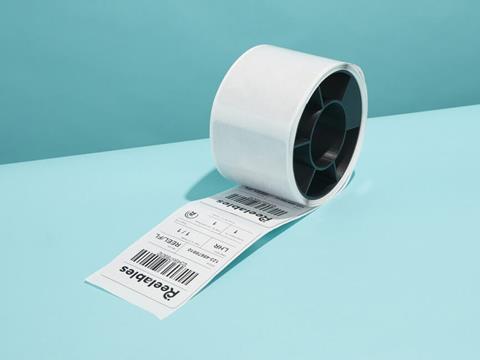
Reelables has launched a printable 5G label solution designed to connect to a cellular network, generate accurate product data, and track products across their supply chains to prevent fraud, theft, and items going missing in transit.
In the wake of the COVID-19 pandemic, industry players have sought to improve visibility across the supply chain. As Reelables explains, there is room for human error in the conventional barcode solution. These require manual scanning and, at times, shipment information may need to be entered by hand.
If a worker misses a scan, enters data incorrectly, or intentionally steals a package, the recorded data will not match the status of the real package. A global report from 2022 suggests that almost one in ten million consumers experienced parcel theft or loss during a twelve-month period, which totals over one billion unreceived packages.
Brand owners also take a financial hit in these scenarios, the company continues, especially those in the pharmaceutical or high-value goods sectors. It adds that, while legacy GPS tracking devices might be considered as a solution, these can be expensive and require reverse logistics and out-of-process workflows.
Instead, Reelables’ 5G Smart Labels automatically collect location data from the cellular network data. From this, they trigger events when a shipment arrives or leaves a warehouse or waypoint, or in the event that an exception is detected.
By generating inventory counts, the labels are said to complete a warehouse audit nearly every minute or less. Therefore, they are designed to accurately track ever piece-level item in real time and supply the information to logistics providers and end users.
A reel-to-reel, thin-film manufacturing process is used to produce the labels, which feature ultra-thin and, according to Reelables, cost-efficient wireless circuits. Apparently, their thin and flexible design means that they can be printed on in thermal barcode printers like ordinary labels; as such, they can be integrated into existing workflows and processes with no additional training required.
This is because a coated zinc battery (as opposed to a conventional lithium battery) is integrated on the same substrate as a wireless circuit. This switch in material not only unlocks thermal printability, but streamlines high-volume applications and air transport, overcoming restrictions on lithium due to its classification as a dangerous good.
Therefore, the solution is said to be ideal for manufacturers and retailers shipping high-value, time-critical products, and those with no control over the infrastructure further along their supply chain.
Initially, the 5G Smart Labels offer the chipset-level integration of NB-IoT, but LTE-M is said to be in the pipeline.
“This is a major breakthrough when it comes to supply chain visibility and automation,” said Brian Krejcarek, CEO and co-founder of Reelables. “Achieving mass production and pervasive deployment of these thin film wireless smart labels will change how businesses track items, reduce theft and loss, and demonstrate accountability to their customers.
“We are excited to bring this to market now so retailers and manufacturers can start printing these labels at scale and lighting up under-utilized LPWAN network capacity with a killer application: tracking the billions of shipments that are made every year around the world.”
The solution is reminiscent of SODAQ, Lufthansa, and Giesecke+Devrient company Pod Group’s paper-thin smart label. It is designed to track small and lightweight items – which, according to the companies, had not been possible prior to the label’s launch.
Fergal O’Carroll, CRO at Scurri, discussed the rise in doorstep parcel theft and the ways in which the packaging industry could combat it – highlighting the importance of real-time data and synergy between ordering, shipping, and delivery processes and systems.
If you liked this article, you might also enjoy:
The Lidl approach to packaging sustainability
How did Brazil achieve its 100% aluminium can recycling rate – and can it be replicated in the EU?
Experts have their say on the EU’s Packaging and Packaging Waste Directive revisions
A deep dive into the most important packaging sustainability trends and solutions


















No comments yet